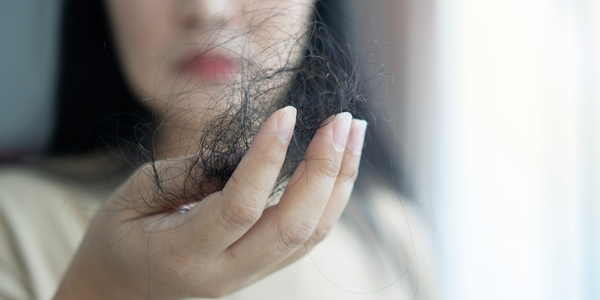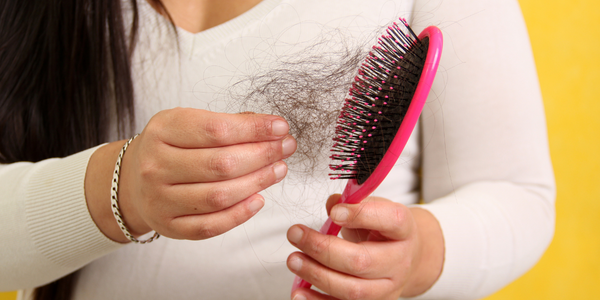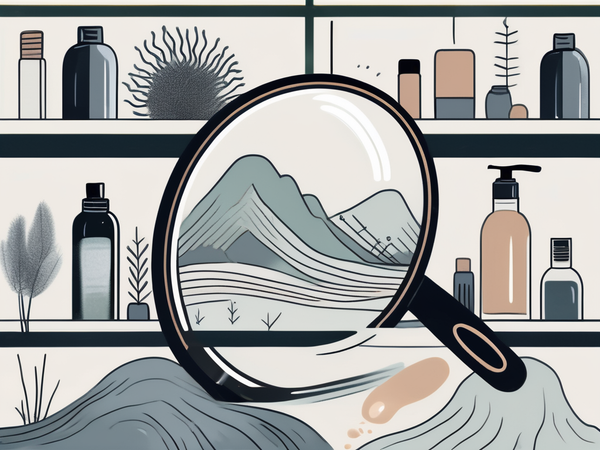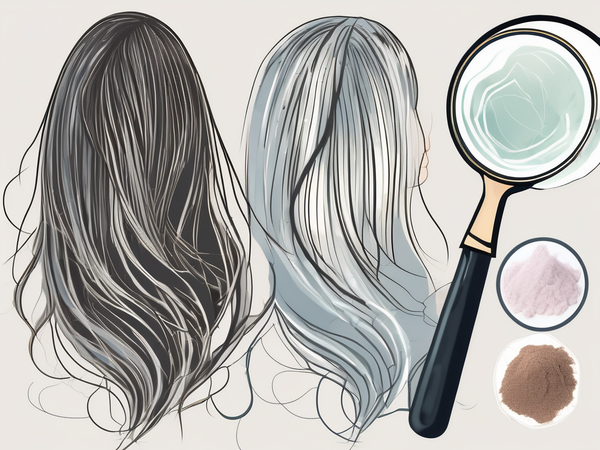Selenium is an important trace element your body needs for thyroid hormone metabolism, DNA synthesis, and reproduction. But did you know selenium is essential for your hair health too? If not, but want to know more, you have come to the right place.
This blog talks about how selenium is related to and impacts your hair health. In addition, you’ll find a healthy way to include selenium in your diet. So, read in full.
How Selenium Helps Control Hair Fall
1. Fight Free Radicals
Free radicals are known to negatively impact hair and skin health and cause weak hair follicles (eventual hair fall) and premature aging. Your body needs enzymes to speed up the chemical reactions and fighting off free radicals
Selenium helps accelerates the enzyme activity that fight free radical, helps reduce hair fall and also slow down signs of premature skin aging.
2. Proper Functioning of Thyroid Hormone
Severe and prolonged hypothyroidism and hyperthyroidism can lead to excessive hair loss. While selenium is found in several organs, it’s more concentrated in your thyroid and is responsible for the proper functioning of your thyroid hormone. And this thyroid hormone plays a crucial role in controlling hair fall that occurs in patches.
3. Antioxidant Support
Selenium is known to activate enzymes that are important for regenerating antioxidants such as vitamin C. These enzymes are responsible for aiding hair growth and regrowth. The benefits are because of powerful antioxidant nature of vitamin C that helps fight free radicals and also help regulate in cell growth and health.
What are the Other Benefits of Selenium?
1. Boosts your Immunity
Selenium deficiency has been linked to delayed immune response and thus weaker immunity. However, the opposite is true too. For instance, a study reported that selenium supplements might strengthen the immune function in people suffering from hepatitis C, TB, and influenza.
2. Helps Deal with Mental Decline
Oxidative stress, according to research, is associated with neurological diseases such as Alzheimer’s disease, Parkinson’s disease, multiple sclerosis, etc. Fortunately, as selenium is known to deal with oxidative stress because of its antioxidant nature, it can help improve the aforementioned conditions.
Even a study states that antioxidant foods in both supplements and food may help improve memory in patients suffering from Alzheimer’s.
3. May Reduce the Risk of Cancers
Selenium is known to reduce the risk of cancers. For instance, a study states that selenium, because of its ability to reduce DNA damage and fight free radicals, selenium can boost your immunity and destroy cancer cells.
How to Include Selenium in your Diet To Reduce Hairfall and Ensure Good Hair Health?
The best food sources of selenium are red meat, poultry, organ meat, eggs, seafood, and Brazil nuts.
Well, you must have noticed that most selenium food sources are not vegan. This is when natural plant-based selenium supplements come into the picture.
The supplements listed below are vegan and contain selenium along with numerous other nutrients good for your hair health. Let’s learn more about them below:
Multivitamin for Her
Multivitamin for Her is a multivitamin providing with essential nutrients an 18–49-year-old female requires to maintain overall wellbeing and, of course, better hair health. It comes with B vitamins, iron, copper, vitamin D, K, A, and C, along with selenium, hyaluronic acid, etc. This supplement can help:
-
Improve Hemoglobin Levels (which stimulates hair growth)
-
Reduces the Risk of UTIs
-
Improves Energy
Multivitamin for Her comes in a unique 2-in-1 delayed release technology with capsule containing fast-acting vegan omega oil and delayed-release multivitamin beadlets. This combination ensures easy and complete absorption of the nutrients ensuring better overall benefits for sustained period of time.
Hair Fall Control
Hair Fall Control is yet another unique plant based formulation from Wellbeing Nutrition that is curated to support hair health. This supplement comes with:
Selenium: It stimulates the production of thyroid hormone that regulates hair growth.
-
KeranatTM: A patented complex of miliacin that helps strengthen the hair root.
-
Zinc: It helps with the growth & repair of hair tissues and nourishes oil glands around the follicles.
-
Iron: It helps improves the capacity of Hemoglobin to carry oxygen and thus stimulates hair growth.
-
Amla: It strengthens your scalp, stimulates hair growth, and prevents hair fall.
-
Coconut Oil: Provides Fatty acids to help nourish the scalp and prevent hair from breaking.
This supplement is based on a unique nanotechnology that revolutionizes the way you consume supplements with better absorption and bioavailability of nutrients. Just place this strawberry-flavored melts oral strip on your tongue and watch it dissolve within seconds. And that’s all you have to do to reap the benefits.
Wrapping Up
While selenium deficiency is uncommon, it still can impact your body negatively. Not only selenium deficiency downgrades your hair health, but it also increases the risk of cancer and affects the synthesis of thyroid hormone. Therefore, make sure to consume ample selenium each day.
Fortunately, this blog mentions Hair Fall Control and Multivitamin for Her that, along with selenium, offer several other nutrients important to reduce hair fall and ensure good hair health. So, make the most of it by including them in your daily routine and ensure better hair support.
References
Robinson PK. Enzymes: principles and biotechnological applications. Essays Biochem. 2015;59:1-41. doi: 10.1042/bse0590001. Erratum in: Essays Biochem. 2015;59:75. PMID: 26504249; PMCID: PMC4692135. https://www.ncbi.nlm.nih.gov/pmc/articles/PMC4692135/
Ventura M, Melo M, Carrilho F. Selenium and Thyroid Disease: From Pathophysiology to Treatment. Int J Endocrinol. 2017; 2017:1297658. doi: 10.1155/2017/1297658. Epub 2017 Jan 31. PMID: 28255299; PMCID: PMC5307254. https://www.ncbi.nlm.nih.gov/pmc/articles/PMC5307254/
Lobo V, Patil A, Phatak A, Chandra N. Free radicals, antioxidants and functional foods: Impact on human health. Pharmacogn Rev. 2010 Jul;4(8):118-26. doi: 10.4103/0973-7847.70902. PMID: 22228951; PMCID: PMC3249911. https://www.ncbi.nlm.nih.gov/pmc/articles/PMC3249911/
Ventura M, Melo M, Carrilho F. Selenium and Thyroid Disease: From Pathophysiology to Treatment. Int J Endocrinol. 2017;2017:1297658. doi: 10.1155/2017/1297658. Epub 2017 Jan 31. PMID: 28255299; PMCID: PMC5307254. https://www.ncbi.nlm.nih.gov/pmc/articles/PMC5307254/
Puspitasari IM, Abdulah R, Yamazaki C, Kameo S, Nakano T, Koyama H. Updates on clinical studies of selenium supplementation in radiotherapy. Radiat Oncol. 2014 May 29;9:125. doi: 10.1186/1748-717X-9-125. PMID: 24885670; PMCID: PMC4073179.
Santos JR, Gois AM, Mendonça DM, Freire MA. Nutritional status, oxidative stress and dementia: the role of selenium in Alzheimer's disease. Front Aging Neurosci. 2014 Aug 28;6:206. doi: 10.3389/fnagi.2014.00206. PMID: 25221506; PMCID: PMC4147716. https://www.ncbi.nlm.nih.gov/pmc/articles/PMC4147716/




























